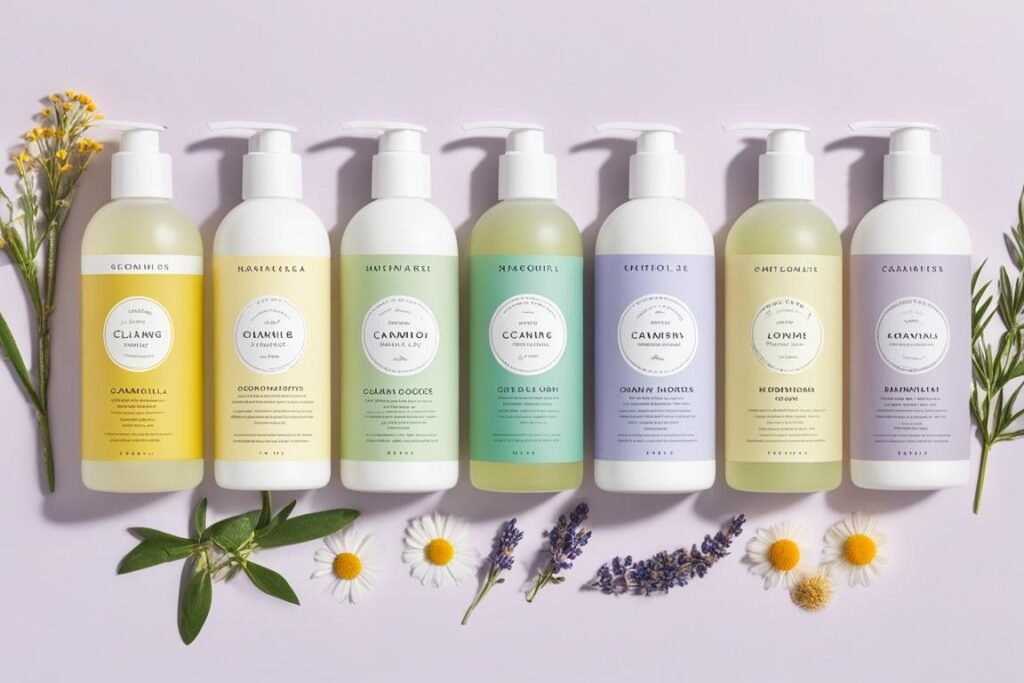Pregnancy Safe Skin Care: Pregnancy is a beautiful journey filled with excitement and anticipation. Along with the joy of expecting a baby, your body goes through numerous changes, including those in your skin. It is important to adjust your skincare routine during pregnancy to ensure the safety of both you and your baby. By using pregnancy-safe skin care products and understanding the changes in your skin, you can maintain a healthy and glowing complexion throughout this special time.
Key Takeaways:
- Adapting your skincare routine during pregnancy is essential for the safety of you and your baby.
- Understanding the changes in your skin can help you choose the right pregnancy-safe products.
- Avoid harmful ingredients and opt for gentle formulations that nourish and protect your skin.
- Build a pregnancy-safe skincare routine that includes cleansers, serums, moisturizers, and sunscreen.
- Consult with your healthcare provider for personalized advice on skincare during pregnancy.
Skin Changes During Pregnancy
Pregnancy is a beautiful and transformative journey, but it also brings about changes in the body, including the skin. These changes are primarily attributed to hormonal fluctuations that occur during this time. Understanding how your skin may change during pregnancy can help you adapt your skincare routine to address specific concerns and maintain a healthy complexion.
Hormonal Changes
During pregnancy, your body experiences a surge in hormones, particularly estrogen and progesterone. These hormonal changes can have a profound impact on your skin. Increased estrogen levels can enhance blood flow and oil production, leading to skin that may appear more radiant and glowing. On the other hand, elevated progesterone levels can result in decreased sebum production, leading to drier skin.
Acne During Pregnancy
For some women, pregnancy hormones can trigger the onset or exacerbation of acne. The increased oil production, combined with dead skin cells and bacteria, can clog pores and cause breakouts. It is important to note that not all women will experience acne during pregnancy, and the severity may vary. If you are prone to acne, it is essential to choose skincare products that are gentle and pregnancy-safe.
Dry Skin During Pregnancy
While some women may experience oily skin during pregnancy, others may find that their skin becomes dry and flaky. The hormonal changes can disrupt the skin’s natural moisture barrier, leading to increased water loss and dryness. It is crucial to hydrate your skin with moisturizers that are specifically formulated for pregnancy and free from harmful ingredients.
Sensitive Skin During Pregnancy
Pregnancy hormones can also make your skin more sensitive and reactive. You may find that your skin becomes easily irritated or develops redness and itching. It is essential to avoid harsh skincare products and opt for gentle formulations that soothe and nourish the skin. Look for products with non-irritating ingredients and perform patch tests before incorporating new products into your routine.
As your body undergoes remarkable changes during pregnancy, it’s important to adapt your skincare routine to address the unique needs of your skin. By choosing pregnancy-safe products, such as gentle cleansers, hydrating moisturizers, and appropriate treatments, you can nurture your skin and maintain a healthy, radiant complexion throughout this beautiful journey.
Ingredients to Avoid During Pregnancy

When it comes to skincare during pregnancy, it’s essential to be aware of certain ingredients that should be avoided. These ingredients have the potential to cause harm to the developing baby and are best left out of your skincare routine. Here are some of the ingredients to steer clear of:
- Retinoids: Retinoids, including retinol and tretinoin, are commonly found in anti-aging skincare products. However, these vitamin A derivatives may increase the risk of birth defects and should be avoided during pregnancy.
- Salicylic Acid: Salicylic acid is often used in acne treatments and exfoliants. While it is generally considered safe in small amounts, it is best to avoid high concentrations and stick to pregnancy-safe alternatives.
- Hydroquinone: Hydroquinone is a skin-lightening ingredient commonly used to treat hyperpigmentation. However, there is limited data on its safety during pregnancy, so it’s best to avoid products containing this ingredient.
- Chemical Sunscreens: Chemical sunscreens, including oxybenzone and avobenzone, have been associated with potential hormone disruption. Opt for mineral sunscreens with ingredients like zinc oxide and titanium dioxide for safe sun protection.
Make Informed Choices for a Healthy Pregnancy
When shopping for skincare products during pregnancy, it’s important to read product labels carefully. Look for products that are specifically formulated as pregnancy-safe or free from the aforementioned ingredients. Choosing natural and gentle alternatives can help you maintain a healthy skincare routine while ensuring the safety of you and your baby.
“By avoiding harmful ingredients and choosing gentle and nourishing products, you can have radiant skin throughout your pregnancy.”
Pregnancy-Safe Cleansers

During pregnancy, it is important to prioritize the use of gentle cleansers that are free from harmful ingredients. The skin undergoes various changes during this time, making it more sensitive and susceptible to irritation. By choosing pregnancy-safe cleansers, you can maintain a healthy and glowing complexion without compromising the well-being of you and your baby.
Gentle cleansers are formulated with natural ingredients and are free from harsh chemicals that could potentially harm your developing baby. These cleansers effectively remove dirt, oil, and impurities from the skin without causing dryness or irritation.
Ceramides and hyaluronic acid are key ingredients to look for in pregnancy-safe cleansers. Ceramides help to strengthen and protect the skin barrier, preventing moisture loss and maintaining optimal hydration levels. Hyaluronic acid, on the other hand, acts as a humectant, attracting and retaining moisture in the skin, leaving it plump and supple.
Here are a few pregnancy-safe cleansers to consider:
| Product | Main Ingredients | Skin Type |
|---|---|---|
| Cetaphil Gentle Skin Cleanser | Cetyl Alcohol, Propylene Glycol, Sodium Lauryl Sulfate | All Skin Types |
| Glossier Milky Jelly Cleanser | Rosewater, Comfrey Root Extract, Poloxamer | Normal to Dry Skin |
| La Roche-Posay Toleriane Hydrating Gentle Cleanser | Ceramides, Niacinamide, Glycerin | Dry to Sensitive Skin |
| First Aid Beauty Face Cleanser | Glycerin, Allantoin, FAB Antioxidant Booster | All Skin Types |
It’s important to note that everyone’s skin is unique, and what works for one person may not work for another. Consider your skin type, preferences, and any specific concerns before choosing a pregnancy-safe cleanser that suits you best.
Remember, taking care of your skin during pregnancy not only helps you maintain a radiant complexion but also promotes self-care and enhances your overall well-being. Always consult with your healthcare provider for personalized advice on skincare during pregnancy.
Pregnancy-Safe Facial Oils

During pregnancy, it’s essential to choose skincare products that are safe and nourishing for both you and your baby. Facial oils, such as rosehip oil and argan oil, can provide hydration and nourishment to your skin, helping to maintain a healthy and glowing complexion. These pregnancy-safe facial oils offer numerous benefits for your skin, including softening wrinkles and reducing the appearance of stretch marks.
Rosehip oil, derived from the Rosa canina rose plant, is rich in essential fatty acids and antioxidants. It deeply hydrates and moisturizes the skin, promoting elasticity and reducing dryness. Additionally, rosehip oil contains vitamin A and C, which can help improve the overall appearance of the skin, including reducing hyperpigmentation.
Argan oil, sourced from the kernels of the Argania spinosa tree, is another pregnancy-safe facial oil that offers excellent hydration and nourishment. It is rich in essential fatty acids, antioxidants, and vitamin E, making it an effective moisturizer that can help soothe and soften your skin. Argan oil also has anti-inflammatory properties that can help calm sensitive skin.
The Benefits of Pregnancy-Safe Facial Oils:
- Hydrates and moisturizes the skin
- Softens wrinkles and fine lines
- Reduces the appearance of stretch marks
- Improves skin elasticity
- Soothes and calms sensitive skin
- Provides essential fatty acids and antioxidants
Using pregnancy-safe facial oils is simple. After cleansing your face in the evening, apply a few drops of rosehip oil or argan oil to your fingertips and gently massage it into your skin. This allows the oil to penetrate deeply and deliver its nourishing benefits. You can also mix a few drops of facial oil with your pregnancy-safe moisturizer for added hydration.
It’s important to note that while facial oils can be beneficial during pregnancy, everyone’s skin is unique. If you have any concerns or specific skin conditions, it’s always best to consult with your healthcare provider or dermatologist before introducing new skincare products into your routine.
Non-Retinoid Pregnancy-Safe Serums for Brightening & Treating Discoloration

During pregnancy, many women experience changes in their skin, including discoloration and uneven skin tone. However, using the right skincare products can help address these concerns safely. Non-retinoid serums are an excellent choice for brightening the skin and treating discoloration without any potential harm to you or your baby.
When selecting pregnancy-safe serums, look for those specifically formulated to address discoloration and promote a more even skin tone. Ingredients such as vitamin C, hyaluronic acid, and niacinamide are highly effective in achieving these results.
The key benefits of incorporating non-retinoid serums into your pregnancy skincare routine include:
- Improved skin tone
- Reduction in pigmentation and dark spots
- Increased hydration and moisture retention
These serums work by brightening the skin, reducing the appearance of discoloration, and promoting a more radiant complexion. Vitamin C, a potent antioxidant, helps even out skin tone and reduce the appearance of dark spots. It also boosts collagen production, which can help improve the overall texture of the skin. Hyaluronic acid provides deep hydration, ensuring your skin stays moisturized and plump. Niacinamide helps regulate sebum production, promoting a more balanced complexion.
Treating discoloration and brightening the skin during pregnancy is possible with non-retinoid serums. The key is to choose the right ingredients, such as vitamin C, hyaluronic acid, and niacinamide, which provide effective results without any potential harm to you or your baby.
Here’s an example of a table showcasing some pregnancy-safe brightening serums:
| Skin Concern | Pregnancy-Safe Brightening Serums |
|---|---|
| Discoloration | Vitamin C Serum |
| Pigmentation | Hyaluronic Acid Serum |
| Uneven Skin Tone | Niacinamide Serum |
Remember that it’s essential to consult with your healthcare provider before incorporating any new products into your skincare routine during pregnancy. Each pregnancy is unique, and your healthcare provider can provide personalized advice based on your specific needs and concerns.
By using non-retinoid serums containing vitamin C, hyaluronic acid, and niacinamide, you can safely address discoloration and achieve a brighter, more even complexion during pregnancy.
Pregnancy-Safe Sunscreens
When it comes to protecting your skin from the sun during pregnancy, it’s important to choose pregnancy-safe sunscreens that provide effective broad-spectrum protection. Mineral sunscreens containing ingredients like zinc oxide and titanium dioxide are the best options for expectant mothers.
Unlike chemical sunscreens, mineral sunscreens work by sitting on top of the skin and reflecting harmful UV rays away. This makes them safe and gentle for both you and your baby. Additionally, mineral sunscreens provide immediate protection upon application, eliminating the need to wait before going outside.
One of the key ingredients to look for in pregnancy-safe sunscreens is zinc oxide. Zinc oxide forms a physical barrier on the skin that helps block both UVA and UVB rays. It is non-irritating and suitable for sensitive skin.
Titanium dioxide is another mineral sunscreen ingredient that provides effective sun protection. It is less likely to cause skin irritation and is ideal for those with sensitive or reactive skin.
Both zinc oxide and titanium dioxide offer broad-spectrum protection, which means they shield your skin from both UVA and UVB rays. UVA rays can penetrate deeper into the skin and contribute to premature aging, while UVB rays can lead to sunburns.
It’s important to note that chemical sunscreens containing oxybenzone should be avoided during pregnancy. Oxybenzone has been linked to adverse effects on fetal development and hormone disruption. To ensure the safety of you and your baby, opt for mineral sunscreens instead.
Remember to apply sunscreen generously and reapply every two hours for maximum protection. No matter the season or weather, wearing sunscreen is crucial for preventing sun damage and maintaining healthy skin throughout your pregnancy.
| Benefits of Pregnancy-Safe Sunscreens |
|---|
| Provides broad-spectrum protection against UVA and UVB rays |
| Offers immediate sun protection upon application |
| Safe and gentle for both expectant mothers and developing babies |
| Contains effective mineral ingredients like zinc oxide and titanium dioxide |
| Avoids harmful ingredients like oxybenzone found in chemical sunscreens |
Pregnancy-Safe Moisturizers

Hydrating moisturizers are essential during pregnancy to maintain the skin’s moisture balance. It is important to choose moisturizers that are safe for both you and your baby. Look for pregnancy-safe moisturizers that contain ingredients like ceramides and hyaluronic acid, which help hydrate and strengthen the skin barrier.
Ceramides are natural lipids that help improve the skin’s barrier function, locking in moisture and preventing water loss. They are especially beneficial for dry and sensitive skin, providing long-lasting hydration without clogging pores. Hyaluronic acid, on the other hand, is a powerful humectant that can hold up to 1000 times its weight in water, keeping the skin plump and hydrated.
Using pregnancy-safe moisturizers that contain ceramides and hyaluronic acid can help prevent dryness, itching, and irritation that often occur during pregnancy. These ingredients work together to replenish moisture, strengthen the skin barrier, and promote a healthy complexion.
Here are some pregnancy-safe moisturizers that are formulated with ceramides and hyaluronic acid:
| Product | Main Ingredients |
|---|---|
| CeraVe Moisturizing Cream | Ceramides, hyaluronic acid |
| La Roche-Posay Toleriane Double Repair Face Moisturizer | Ceramides, niacinamide, glycerin |
| The Ordinary Natural Moisturizing Factors + HA | Hyaluronic acid, amino acids, ceramides |
| Neutrogena Hydro Boost Gel Cream | Hyaluronic acid, glycerin |
These moisturizers are not only safe for pregnancy but also provide intense hydration and support the skin’s natural protective barrier. Remember to always consult with your healthcare provider before using any new products during pregnancy.
Pregnancy-Safe Makeup
Choosing pregnancy-safe makeup is crucial during this special time to ensure the well-being of both you and your baby. It’s essential to avoid ingredients that could be harmful or cause irritation to your sensitive skin. Opting for gentle formulas with natural ingredients is a wise choice to maintain your beauty routine while prioritizing safety.
One great option to consider is mineral makeup. Mineral makeup is made from natural minerals extracted from the earth and typically does not contain harsh chemicals or synthetic ingredients. It provides excellent coverage while allowing your skin to breathe.
Another important aspect to look for in pregnancy-safe makeup is fragrance-free products. Synthetic fragrances can potentially contain allergens and toxins that may be harmful during pregnancy. Choosing fragrance-free makeup reduces the risk of adverse reactions and keeps your beauty routine safe and pleasant.
When selecting pregnancy-safe makeup, be sure to check the ingredient list for natural ingredients. Ingredients sourced from nature, such as plant extracts, oils, and butters, are generally considered safe for use during pregnancy. These natural ingredients offer nourishing benefits to keep your skin healthy and vibrant.
Opting for gentle formulas is essential during pregnancy, as your skin may be more sensitive and prone to irritation. Avoid makeup products that contain harsh chemicals or irritating ingredients, such as alcohol or artificial dyes. Choosing gentle formulas helps maintain a balanced complexion without compromising your skin’s health.
“During pregnancy, it’s crucial to prioritize the safety of makeup products. Opt for gentle formulas with natural ingredients and avoid harsh chemicals. Your skin will thank you!”
To provide you with some visual inspiration, here’s an image of a pregnant woman applying makeup:
Remember, pregnancy is a unique time, and taking care of yourself includes making informed choices about the products you use. By selecting pregnancy-safe makeup with natural ingredients, gentle formulas, and being mindful of potential irritants, you can continue to enhance your natural beauty throughout this beautiful journey.
Pregnancy-Safe Skincare Routine
During pregnancy, it’s important to prioritize the health and safety of both you and your baby. This includes adjusting your skincare routine to use products that are pregnancy-safe and free from harmful ingredients. Building an effective pregnancy-safe skincare routine involves incorporating a gentle cleanser, hydrating serum, moisturizer, and sunscreen.
Gentle Cleanser
Start your skincare routine with a gentle cleanser that is free from harsh chemicals and artificial fragrances. Look for cleansers that are specifically labeled as pregnancy-safe and formulated with natural ingredients. A gentle cleanser helps remove dirt, oil, and impurities without stripping the skin’s natural moisture.
Hydrating Serum
A hydrating serum is a great addition to your pregnancy skincare routine as it helps replenish moisture and keep your skin hydrated throughout the day. Look for serums that contain ingredients like hyaluronic acid, which has the ability to hold onto water and keep your skin plump and supple.
Moisturizer
Choose a pregnancy-safe moisturizer that is rich in hydrating ingredients such as ceramides and hyaluronic acid. These ingredients help nourish and soothe the skin while maintaining its moisture barrier. Applying a moisturizer after your serum helps lock in hydration and provides a protective layer for your skin.
Sunscreen
Protecting your skin from harmful UV rays is essential, even during pregnancy. Opt for a mineral sunscreen that contains physical blockers like zinc oxide or titanium dioxide. These ingredients provide broad-spectrum protection without penetrating the skin, making them safe for use during pregnancy.
Remember, consistency is key when it comes to skincare. Follow this pregnancy-safe skincare routine every morning and evening to maintain a healthy and glowing complexion throughout your pregnancy journey.
Building a pregnancy-safe skincare routine involves using a gentle cleanser, hydrating serum, moisturizer, and sunscreen. By selecting products that are free from harmful ingredients and suitable for your skin type, you can ensure the health and safety of both you and your baby. Remember to consult with your healthcare provider or dermatologist for personalized skincare advice during pregnancy.
Conclusion
Choosing pregnancy-safe skincare is topical products during pregnancy crucial for maintaining a healthy and radiant safe during personal care products pregnancy complexion while prioritizing the safety of both you and your baby. By avoiding harmful ingredients safety profile of topical products and opting for gentle and nourishing products, you can ensure that use in pregnancy your skincare routine supports your baby’s development and nurtures your changing acid during pregnancy skin throughout pregnancy and lactation your pregnancy journey.
During pregnancy, best skin some skincare safe during pregnancy ingredients, such as retinoids, salicylic acid, hydroquinone, and chemical cosmetic products sunscreens, are best trimester of pregnancy avoided. It is important national institutes of health to read product labels carefully and recommended during pregnancy choose alternatives that are safe for pregnancy. By understanding the changes that occur in your skin during pregnancy, like hormonal fluctuations or increased sensitivity, you can make informed decisions about the products that work best for you.
Consulting with your healthcare provider for personalized advice on skincare during pregnancy is highly recommended. They can provide additional guidance based on your specific needs and any potential concerns. With the right skincare regimen and professional advice, you can achieve a healthy, glowing complexion that boosts your confidence and wellbeing during this special time in your life.
Also Read : Platinum Skin Care: Your Route To Radiant Beauty
FAQs
Q: Can I use my regular skin care products during pregnancy?
A: It’s recommended to review the safety profile of your topical products with your healthcare provider to ensure that they are safe to use during pregnancy.
Q: What are some common skin care ingredients to avoid during pregnancy?
A: Some ingredients like retinoids, salicylic acid, and certain essential oils are considered unsafe to use during pregnancy and are best avoided in skin care products.
Q: Are there any safe alternatives to treat acne during pregnancy?
A: You can consider using products containing ingredients like azelaic acid or glycolic acid, which are generally considered safe to use during pregnancy.
Q: Can topical products be absorbed through the skin during pregnancy?
A: Yes, topical products can be absorbed through the skin, so it’s important to be mindful of the ingredients in skin-care products that you use during pregnancy.
Q: What changes can I expect in my skin during pregnancy?
A: Common skin changes during pregnancy include increased pigmentation, the mask of pregnancy, and issues like acne and stretch marks due to hormonal fluctuations.
Q: Is it safe to use alpha hydroxy acids (AHAs) or beta hydroxy acids (BHAs) during pregnancy?
A: AHAs like glycolic acid are generally considered safe to use during pregnancy, while BHAs like salicylic acid are recommended to be used in lower concentrations during pregnancy.
Q: What is the safety profile of topical retinoids during pregnancy?
A: Topical retinoids are generally not recommended for use during pregnancy due to their potential to cause birth defects, especially when used in higher concentrations.
Q: Can brightening skin care products be safely used during pregnancy?
A: There are pregnancy-safe skin care products available that can help in brightening the skin without containing any ingredients that are considered unsafe for pregnant women.
Q: Are there any specific skin problems associated with pregnancy?
A: Pregnancy can lead to issues like melasma, stretch marks, and acne due to hormonal changes, and it’s recommended to use safe and effective skin care products to address these concerns.
Q: What are the best practices for a safe and effective skin care routine during pregnancy?
A: It’s important to use pregnancy-safe skin care products, maintain a good cleansing and moisturizing routine, and protect your skin from sun exposure by using a broad-spectrum sunscreen with SPF 30 or higher.
Source Links
- https://augustinusbader.com/us/en/evidence/pregnancy-safe-skincare
- https://www.nbcnews.com/select/shopping/best-pregnancy-safe-skin-care-rcna100065
- https://www.mother.ly/pregnancy/pregnancy-safe-skincare/




